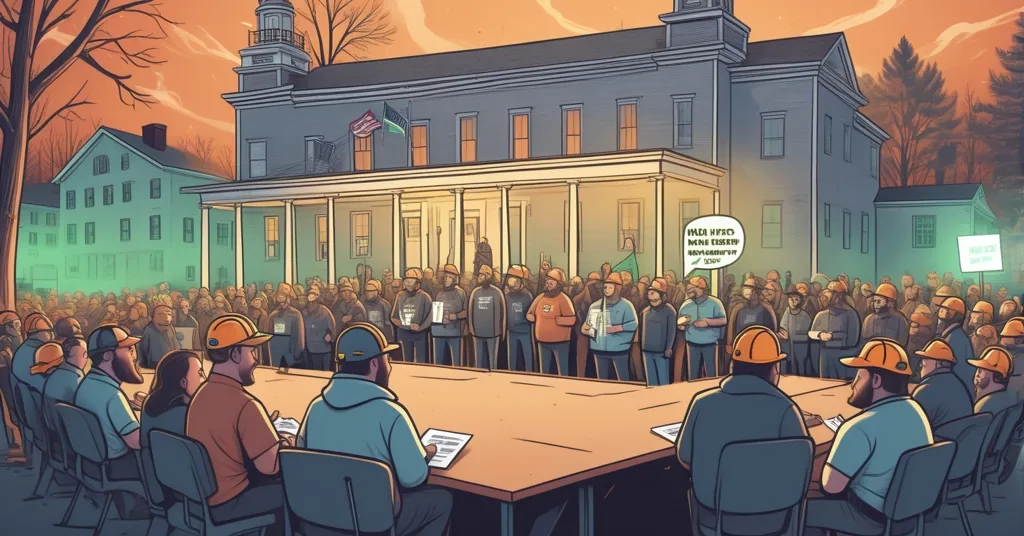New Hampshire’s House Bill 639 Sparks Crypto Mining Deregulation Battle

House Bill 639: New Hampshire’s Crypto Mining Deregulation Debate Ignites Firestorm
New Hampshire is ground zero for a high-stakes showdown over cryptocurrency mining, as House Bill 639 pushes to strip local governments of their ability to slap restrictions on these energy-hungry operations. This legislation has sparked a fierce clash between champions of blockchain innovation and communities worried about noise, environmental fallout, and losing control over their own backyards.
- Main Thrust: House Bill 639 blocks local restrictions on crypto mining, like noise zoning laws, while standardizing taxes for digital transactions.
- Political Stalemate: After two tie votes, the New Hampshire Senate Commerce Committee voted 4-2 for interim review, showing deep rifts among lawmakers.
- Public Storm: Unprecedented feedback from residents highlights fears of losing local authority and facing environmental harm.
The Core of House Bill 639: Deregulation and Beyond
At its heart, House Bill 639 is a bold move to deregulate cryptocurrency mining by barring local governments from enforcing targeted restrictions. This includes zoning laws—local rules that dictate how land and buildings can be used, often to curb noise or industrial activity near homes. Think of the relentless hum of mining rigs with industrial fans running 24/7; under this bill, towns might not be able to quiet them down. For those new to the space, crypto mining is the process of using powerful computers to solve complex mathematical problems, validating transactions on networks like Bitcoin and earning new coins as a reward. It’s a cornerstone of decentralized finance but notorious for its energy consumption and, often, its racket.
Beyond zoning, the bill goes further: it standardizes taxation for digital transactions (a uniform tax rule for buying, selling, or using cryptocurrencies), affirms the right to mine digital currencies, and proposes a specialized blockchain conflict docket in superior courts. This docket would act as a dedicated legal arena to handle disputes related to blockchain and crypto businesses, streamlining resolutions in a niche yet growing field. Lead sponsor Rep. Keith Ammon, a Republican from New Boston, frames this as a shield against unfair treatment of an emerging industry.
“The legislation will protect blockchain and cryptocurrency companies from bias,” said Rep. Keith Ammon, positioning the bill as a defender of tech-driven progress.
Yet, the path through the New Hampshire Senate has been a political minefield. After two deadlock votes—one to push the bill forward, another to kill it—the Senate Commerce Committee opted 4-2 for interim review, a procedural pause meaning more tweaks are needed before a final call. This hesitation reflects a broader tension, as lawmakers like Sen. Denise Ricciardi grapple with constituent backlash while eyeing economic potential.
“I don’t want to vote against it, but we heard from so many constituents, and I would like to have it worked on further,” noted Sen. Denise Ricciardi, capturing the balancing act between innovation and local voices.
Public Outcry: A Community Under Siege?
The flood of public feedback on House Bill 639 has stunned lawmakers. Senators, including Concord Democrat Senator Reardon, report an unprecedented volume of input since discussions began last spring. The core grievance? A loss of local control. Imagine living next to a mining farm that sounds like a jet engine day and night—residents fear they’ll be powerless to stop it if this bill passes. Environmental concerns also weigh heavy, given Bitcoin mining’s historical appetite for dirty energy, though recent shifts show improvement. A report from the MiCA Crypto Alliance and Nodiens reveals coal usage in Bitcoin mining has dropped from 63% in 2011 to 20% in 2024, with renewable energy reliance climbing 5.8% yearly. Still, for many in New Hampshire, the risk of unchecked operations feels like a roll of the dice they’d rather not take.
Economic incentives are part of the equation too. Supporters argue that welcoming crypto businesses could spark job creation and tax revenue, akin to what states like Texas have seen with their pro-mining stance. Rep. Ammon and advocates like Sen. Keith Murphy, known for championing tech-friendly policies, see this as a way to position New Hampshire as a hub for digital assets. But the specter of community disruption looms large—deregulation might scream ‘freedom’ to some, but for others, it’s just a fancy way of saying ‘deal with the damn noise.’
“The legislation would make clear that New Hampshire is ready to embrace the digital asset sector,” declared Sen. Keith Murphy, signaling a bold invite to the crypto industry.
Lessons from Across the U.S.: Cautionary Tales
Peering beyond New Hampshire’s borders offers a stark reality check on crypto mining laws in 2024. Arkansas serves as a glaring warning for senators wary of deregulation. After welcoming mining operations, the state faced a tidal wave of complaints over noise pollution, environmental damage, and even fears of foreign control of local facilities. The result? Tighter regulations to rein in the chaos. This could be a preview of New Hampshire’s future if House Bill 639 passes without guardrails. Meanwhile, in New York, Senator Liz Krueger proposed a tiered tax on electricity for crypto miners on October 2. Miners using less than 2.25 million kWh annually get a pass, but those consuming up to 5 million kWh face a 2-cent-per-kWh fee—a pragmatic jab at curbing mining’s power hunger without outright bans.
These contrasting approaches highlight the fragmented state of crypto regulation in the U.S. New Hampshire stands at a crossroads: follow the deregulatory path and risk community backlash, or take a page from Arkansas and New York by threading a tighter needle. The stakes are high, and the decisions made here could set a precedent for other states wrestling with the same beast.
Global Perspective: Tightening the Net
Internationally, the regulatory screws are turning as well. Russia recently launched a registry of cryptocurrency mining equipment, a collaborative effort by the Ministry of Energy, Federal Tax Service, and Ministry of Digital Development, to crack down on illegal operations siphoning national grid power. This move reflects a broader push to manage mining’s resource drain, a concern New Hampshire lawmakers might need to ponder if deregulation opens the floodgates.
“The creation of such a register will allow us to identify consumers using electricity for mining needs accurately. This is necessary to apply special regulation and taxation to those,” explained Russia’s Deputy Energy Minister Petr Konyushenko, underscoring a global trend toward targeted oversight.
Back in the Granite State, groups like the Satoshi Action Group—a Bitcoin advocacy outfit whose model policies have shaped similar laws across the U.S.—are cheering House Bill 639 as a win for decentralized tech. Their influence highlights a coordinated push to craft crypto-friendly frameworks, often prioritizing Bitcoin’s ethos of sovereignty. But let’s cut the crap: while Bitcoin maximalists might toast this as a middle finger to overreach, blanket deregulation risks ignoring the unique impacts of different blockchain projects. Ethereum, for instance, ditched energy-intensive mining for a Proof-of-Stake model, slashing its environmental footprint. Should altcoin ecosystems face the same deregulatory brush as Bitcoin’s power-hungry rigs? That’s a question worth chewing on.
Environmental Impact of Cryptocurrency: Progress and Pitfalls
Diving deeper into Bitcoin mining’s environmental toll, the numbers paint a mixed picture. Beyond the coal usage drop to 20%, the industry still emits roughly 50 million tons of CO2 annually per some estimates—equivalent to the carbon footprint of a small country. Each Bitcoin mined can rack up thousands in energy costs, a bill that could make your eyes water. New Hampshire’s energy grid, leaning on a mix of nuclear and natural gas with some renewables, isn’t as green as, say, hydro-heavy regions. Unchecked mining here could strain local resources, even if the global trend toward renewables offers hope.
Technological fixes exist—quieter hardware, off-grid solar setups for rigs—but they’re not yet mainstream. If we’re serious about effective accelerationism, pushing tech forward at warp speed, we need to fast-track these solutions alongside deregulation. Otherwise, we’re just hyping castles built on sand, waiting for the tide of public outrage to wash them away.
Balancing Decentralized Dreams with Reality
As a champion of decentralization, I’ll admit House Bill 639 resonates with the spirit of financial freedom Bitcoin was born from. Mining is a pillar of that vision, a way to secure networks without bowing to centralized overlords. But we can’t ignore the messy reality—deregulation could favor industrial-scale Bitcoin operations over smaller, innovative projects or community interests. Local control matters; small-town officials argue zoning powers are their only shield against becoming collateral damage in the crypto gold rush. If the bill passes, we might see an industry boom, but legal challenges or protests could follow. If it fails, New Hampshire risks lagging in the digital asset race. Either way, the ripple effects will stretch far beyond state lines.
Key Questions on New Hampshire’s Crypto Mining Debate
- What is House Bill 639 trying to accomplish in New Hampshire?
It aims to prevent local governments from restricting crypto mining through zoning laws, standardize taxes for digital transactions, affirm mining rights, and establish a specialized court system for blockchain disputes. - Why are residents so outspoken about this legislation?
Many are alarmed by the potential loss of local authority to manage disruptive mining operations, alongside worries about noise pollution and environmental damage. - How does this fit into broader U.S. crypto regulation trends?
It mirrors a deregulatory push in some states, clashing with stricter controls like Arkansas’s post-backlash laws and New York’s proposed energy taxes for miners. - Is Bitcoin mining getting more sustainable?
Yes, coal reliance has fallen to 20% in 2024 from 63% in 2011, with renewable energy use growing by 5.8% annually, though significant carbon emissions persist. - What are the environmental risks of Bitcoin mining in New Hampshire?
With a grid reliant on nuclear and natural gas, unchecked mining could strain resources, amplify carbon footprints, and disrupt communities via noise and power demands. - What are the potential downsides of deregulation without oversight?
Risks include environmental harm, community unrest from noise and industrial sprawl, and eroded local governance, as seen in Arkansas’s regulatory U-turn after public outcry.
House Bill 639 isn’t just a piece of paper; it’s a battleground for the soul of decentralization versus the grit of real-world impact. New Hampshire faces a defining choice—bet big on becoming a crypto haven or heed the warnings from other states and nations taming the same wild beast. One thing is clear: the fight over crypto mining is far from over, and the outcome here could echo across the decentralized landscape. Let’s push for progress, but not by tuning out the very communities we claim to liberate. No hype, no bullshit—just a hard look at the stakes.



